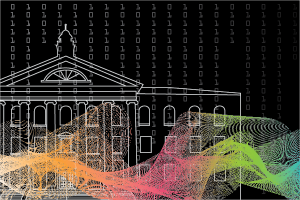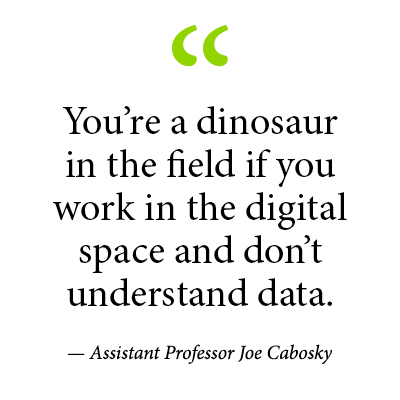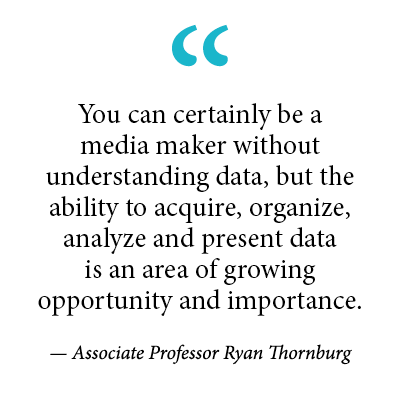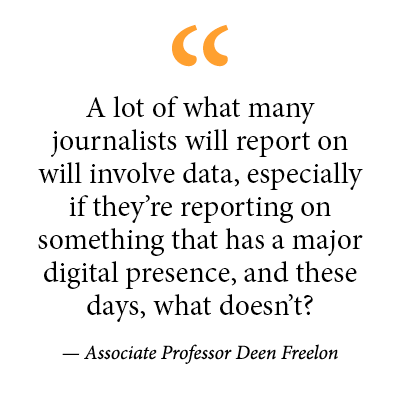Numerous Hussman School opportunities target data literacy to ensure students have 'absolutely crucial' skills needed to succeed

Understanding how to analyze data sets and use data to find and share news content is a vital skill in the world of media and journalism today. At the UNC Hussman School of Journalism and Media, students have a wide array of opportunities — both extracurricular and for-credit — to grow and master data literacy.
Faculty members within the school say understanding how to analyze data is crucial to students entering the world of media and communications, and they are striving to enrich students with the knowledge needed in today's advancing digital world.
Carolina Data Desk with Associate Professor Ryan Thornburg
Carolina Data Desk is a student organization that provides informational tools for journalists to better develop data-driven stories. Part of the UNC Center for Innovation and Sustainability in Local Media, Carolina Data Desk offers feasible data solutions and support to existing and developing local news organizations. Other initiatives of the Center, including the Reese News Lab and Emerging Technologies Lab, introduce cutting-edge technologies, such as photogrammetry and virtual reality, to Hussman School students.
Members use data to approach stories from many angles, with topics ranging from college basketball to local politics. The Desk's educational blog provides many data-related tools and tutorials, such as "How We Helped a Journalist Fact-Check With Data" and "Free Tools for Freelancers."
In June 2018, Carolina Data Desk co-hosted a training on data journalism with Reveal/The Center for Investigative Reporting and Wake Forest University. The two-day training offered help for journalists and students to leverage data skills in their reporting.
In the Information Age, data is an irreplaceable component of everyday life. In the Hussman School, understanding data and algorithms becomes essential to the accuracy and credibility of news stories. The training to use data to facilitate storytelling and research transforms students from media consumers to media makers, bringing students more job opportunities and making them competitive in the workplace.
"You can certainly be a media maker without understanding data, but the ability to acquire, organize, analyze and present data is an area of growing opportunity and importance," said Associate Professor Ryan Thornburg, one of three faculty members associated with the Center for Innovation and Sustainability in Local Media. "The more that our students invest their time in learning about the technical, legal, social and ethical implications of data and computational techniques, the more likely they will be able to take advantage of these opportunities."
Carolina Data Desk pairs Hussman School students with journalists who seek data and informational support to boost their news stories. As the organization's faculty adviser and as a data journalist in the school, Thornburg provides students the computational knowledge and resources to discover hidden insights behind every story. Students thus gain real-world experience by working with professionals in the industry.
Moreover, Thornburg collaborates with organizations outside of the Hussman School, such as Carolina Analytics & Data Science, to broaden students' horizons.
"I try to connect with student organizations outside the school, because that kind of cross-pollination is where transformational creativity can happen," Thornburg said. "We may not be the best on campus at unsupervised machine learning, but we are the best at telling compelling true stories."
“MEJO 490.001: Big Data and Media Analytics” with Associate Professor Deen Freelon
Taught by Associate Professor Deen Freelon, the “MEJO 490.001: Big Data and Media Analytics” course offers students the opportunity to learn the computer programming skills needed to visualize and summarize trends shown in exponential datasets on social media usage.
The course is intended to teach students how to use Python, a high-level programing language, to analyze social media and large amounts of text-based data. The course serves as an introduction to the analysis of textual data using "Big Data" methods. While no prior knowledge of social media data or program coding is necessary for students coming into the class, Freelon said, some students bring prior knowledge and experience to the course.
But, because most students have little or no programming knowledge, Freelon said he starts from scratch. He teaches the program from the ground up, and for the first month or so, students learn the basics of coding with Python before they begin working with data sets.
Freelon said having skills such as understanding data, being able to work with data and being able to analyze data is absolutely crucial for students entering the world of media, journalism and communications.
"It's really important because we live in a data-saturated society," Freelon said. "A lot of what many journalists will report on will involve data, especially if they're reporting on something that has a major digital presence, and these days, what doesn't?"
Freelon said these skills would be particularly useful for students who might one day report on or work closely with social media or government-released data, but some of the many uses of these skills may not be as clear.
"There are certain areas where I feel like the applications are a little clearer than others," Freelon said. "But with pretty much anything that is text-based and touches the digital world, the application of these techniques will be fairly obvious."
Junior Yujie Tao ’20, who took the course in Spring 2018, is an advertising and computer science double major. Tao came into the course with a decent amount of prior coding knowledge that she gained from past computer science classes. Tao said she was worried her prior experience with the subject would prevent her from learning much in Freelon's class, but said this course was unlike any she'd taken in computer science.
"In my computer science courses, I've learned how to use different programming languages, but this class taught me how to apply that language to a specific area," Tao said.
Beth Clifford '19 said it was her lack of experience with big data that drew her to the class. Clifford is a public relations and public policy double major, and said she was drawn to the description of the course because of her interest in digesting large amounts of data to share with the public.
"Being able to analyze large amounts of social media data is really helpful for journalists and allows them to understand public discourse, ultimately making them better able to report," Clifford said.
A graduating senior, Clifford said the skills she gained in the class have impressed her potential employers as she's been on her job search.
The course is an introductory course, Freelon said, so students won't be experts after the semester. But, he said students in the past have either taken what they learned in the course and utilized the skills as best they could in their chosen professions, or gone on to further their education by going to graduate school.
"MEJO 713: Digital Data and Analytics" with Assistant Professor Joe Cabosky
Another course in which students are given the opportunity to learn how to work with data is Assistant Professor Joe Cabosky's "MEJO 713: Digital Data and Analytics" online master's course. There, students explore the fundamental concepts and principles that underlie techniques for extracting useful information and knowledge from data, with a focus on modern digital platforms.
This course works to help students view problems from a data perspective and understand how to systematically analyze such problems.
The master's course is administered online to provide flexibility for working professionals in the Hussman School’s Master’s in Digital Communication program. Similar to Freelon's course, Cabosky said this course is not targeted at making students data experts. Instead, it provides them with the skills needed to understand data on a basic level and apply that knowledge.
 “You’re a dinosaur in the field if you work in the digital space and don’t understand data,” Cabosky said.
“You’re a dinosaur in the field if you work in the digital space and don’t understand data,” Cabosky said.
Students who have taken advantage of these opportunities within the Hussman School have gone on to have careers as researchers, developers and specialized reporters. But, Cabosky said, data literacy is a vital skill for any student entering the world of media, journalism or communications.
Competency in digital communication at the professional level must extend beyond a basic understanding of how to use digital methods of communication, Cabosky said. Understanding how to take data, analyze it and use it to better produce content, manage social media accounts or webpages is a skill that demonstrates professional competency in communicating in the digital age.
“Data is a representation of what people are doing, what they think and how they feel,” Cabosky said. “The big goal is making sense of the audience that exists on the other side of your platform so that you can improve your content.”

